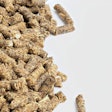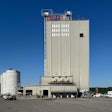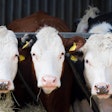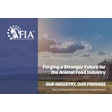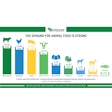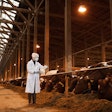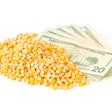
DSM Animal Nutrition & Health has received FDA approval of a new enzyme, fumonisin esterase.
Paige Gott, Ph.D., DSM mycotoxin and Hy•D® category manager, said fumonisin esterase is for the degradation of fumonisins present in swine feed.
“This is the first mycotoxin degrading ingredient to go through FDA’s Food Additive Petition (FAP) process and will be the first product ever to be approved for degrading fumonisins in feed in the U.S. market,” said Gott.
Mycotoxin survey results released during World Pork Expo
Gott also shared updates on DSM's North America mycotoxin survey at a World Pork Expo press conference on June 9.
Survey results showed mycotoxin contamination trends in U.S. corn ingredients, focusing on the year-to-year changes across the country.
“Among the corn samples tested in our annual survey, 90% of the samples were positive for mycotoxins in 2021, versus 88% in 2020,” said Gott.
“We also identified that type B trichothecenes and Zearalenone increased in prevalence from 2020 to 2021, indicating an increased likelihood of exposure in herds and greater potential for negative effects."
Mycotoxin impact on swine feed performance
Lan Zheng, Ph.D., DSM technical services manager, discussed why it’s imperative now — through an anticipated season of high corn prices — to make sure mycotoxins aren’t affecting swine feed performance.
“Mycotoxins can have several negative outcomes to swine health and performance,” said Zheng. “From reproductive impairment to digestive disorders, decreased vaccine efficacy, and increased susceptibility to infections, it can be devastating to a swine operation.
"And with high corn prices, it’s imperative right now that feed is working without concern of performance-related losses," she said.
Implement a mycotoxin risk-management program
Gott shared why it's important to implement a mycotoxin risk-management program in your operation.
“Proper sampling and analysis are key to a comprehensive mycotoxin risk-management program," said Gott.
"Mycotoxins are not evenly distributed throughout feed, leading to variation in exposure over time. Therefore, routine analysis can provide insights into the types and levels of mycotoxins animals are exposed to.
"With this information, it's possible to develop a customized mitigation strategy to address challenges."






